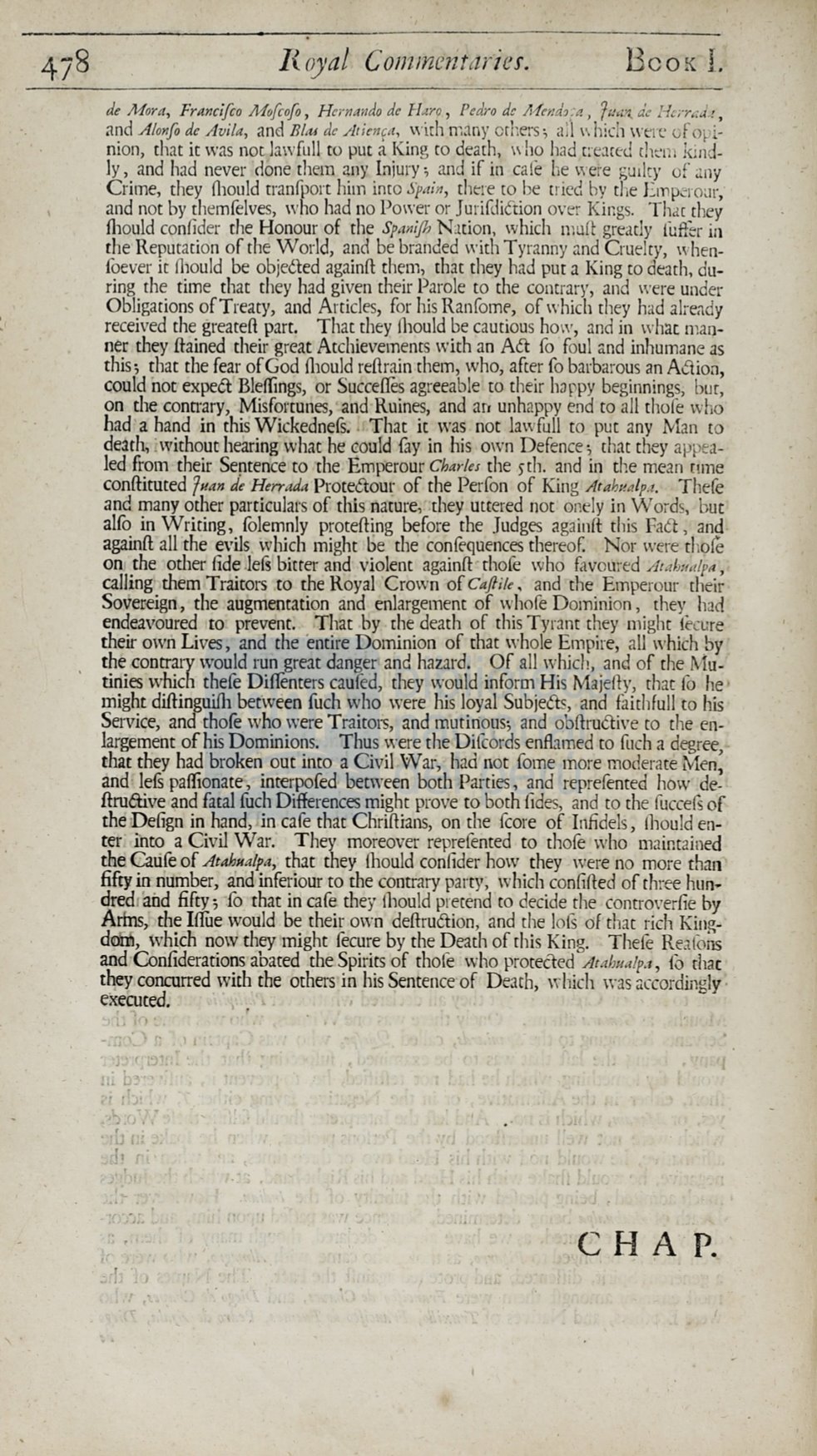

R oyaL Commeritar'ies.
BooK
L
de
Mora, Francifco Mofcofo , Hernando de R aro , Pedro
de
Adena'o¡a,
'{14<,11_
a'e He;-rsd.1,
and
Alonfo de Avila,
ancl
B/,u de Atienfa,
wirh rr::tny orhers; ali
1,
hich werc 0foµi–
nion, that it was not lawfull to put a King co death,
1,
ho had c:·e:ueJ
che1
1
kind–
ly, and had never clone chem any Injury; and if in
ca[e
he \Yere gu1lcy of any
Crime, they fhould tranfport hirn inro
Spain,
thtre ro be cried
by
the Emperour,·
and not by themfelves, wpo had no Power or Jurifdiétion over Kings. Thacthey
íhould confider che Honour of the
Spanijh
Nation, which muír greatly Cuffer in
the Reputation of the World, and be branded wich Tyranny and Cruelty, when–
foever it fhould be objeél:ed againíl: them, thac they had puc a King co deach, du–
ring the time that they had given their Parole to che contrary, and were under
Obligations ofTreaty, and Articles, for hisRanfome, of which chey had already
received the greateíl part. Thac they fhould be cautious how, and in whac rnao–
nér they fiained their great Atchievements wich an Aél: fo foul and inhumane as
this; thac the fear ofGod íhould reílrain them, who, after
fo
barbarous an Aétion,
could noc expeél: Bleílings, or Succeífes agreeable
to
their happy beginnings, bur,
on the conn·ary, Misformnes, and Ruines, and arr unhappy end co ali chofe who
had a hand in chis Wickednefs. That it was not lawfull
to
puc any Man to
dearh,
;withom hearing what he <muid fay in his own Defence; that they appea–
led from their Se!]tence to che Emperour
Charles
che
5
th. and in che mean tune
coníl:ituted
'fuan de Herrada
Proteél:our of che Perfon of King
ArahP.alpa.
Thefe
and many other particulars of thís nature, they uttered noc onely in Words, bue
alfo in Writing, folemnly proteíl:ing befor.e the Judges againíl: chis Faél:, and
againfr ali the evils which might be che con[equences thereof. Nor were thofe
on1the other ftde ,!eís bitter and violent againíl:' chofe who favoúred
A1al1t1alpa ,
calling· them Traitors to the Royal Crown of
Cajfile,
and che Ernperour rheir
Sovei:eign, the augmentation and enlargemenc of whofe Dominion, they had
endeavoured to prevent. Thac by che death of thisTyranc they might fecure
their own Lives, and the ·entire Dominion of thac whole Empire, all which
by
the contrary would run greac danger and hazard. Of ali which, and of the Mu–
tinies which che[e Diífenters caufed, they would inform His Majefry, rhac fo he ,
might difünguifh between fuch who were his loyal Subje&, and fairhfull
to
his
Service, and thofe who were Traitors, and rnutirious; and obíl:ruél:ive
to
the en–
largement of his Dorninions. Thus were rhe Difrords enflamed to fiJCh a degree,
that
they had broken out inro a Civil War, had not fome more moderate Men,
and lefs paffionate, interpofed between both Parries , and reprefenced hów de–
firuél:ive and fatal fuch Differences rnighc prove to both íides, and to che fuccefs of
the Defign in hand, in cafe thát Chrifiians, on the fcore of Infidels, íl1ould en–
ter into a Civil War. They moreover reprefenced to chofe who maimained
the
Cau[e
of
AtahHalpa,
chat they fhould conftder how they were no more than
fifcy
in number, and inferiour coche concrary party, which conlified of three hun–
dred,
·and
fifty; fo that in cafe they íl1ould precend to decide che comroverfie
by
Arfns, the lífue would be their own deíl:ruél:ion, and che lofs of chac rich King–
don!t, whi~h now they might fecure by che Deach of rhis King. Thefe Reafons
and Confiderarions abaced che Spirits of chofe who proteéted
Att1hualp.1,
fo rhac
th~y concurred wich the ochers in bis Sentence of Deach, "'hich was accordingly ·
executed.
.r
J
'ir
!'
.,.
CH A P.














